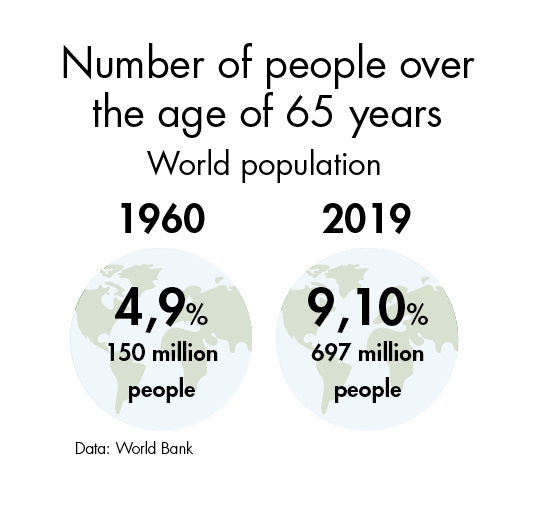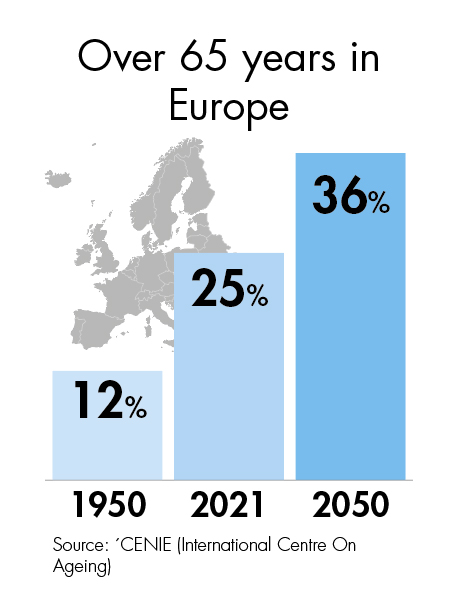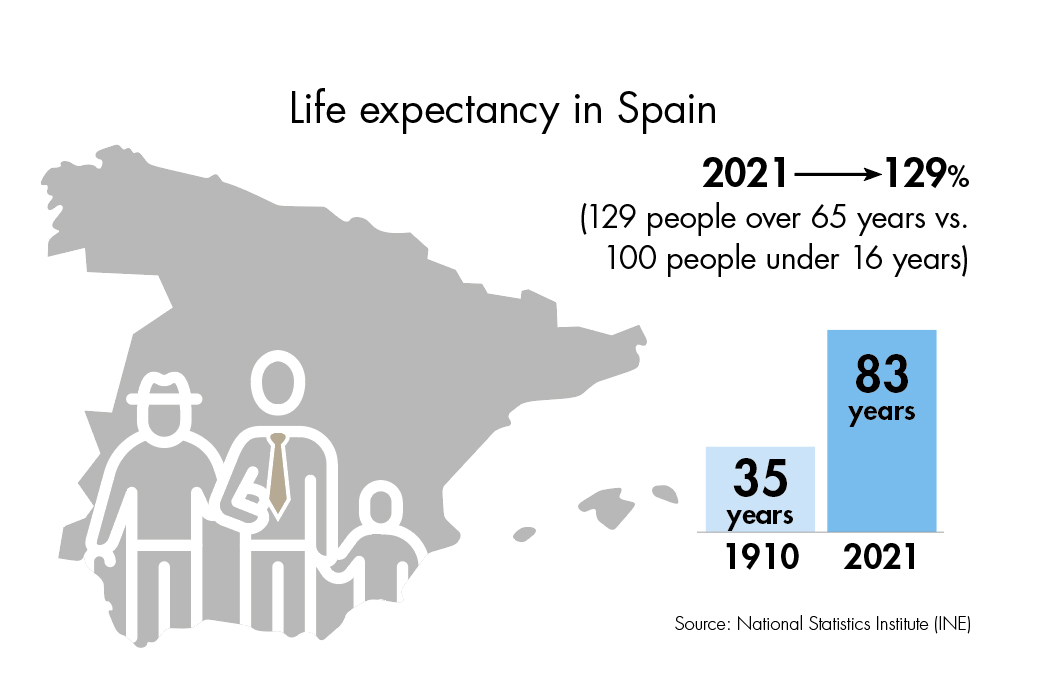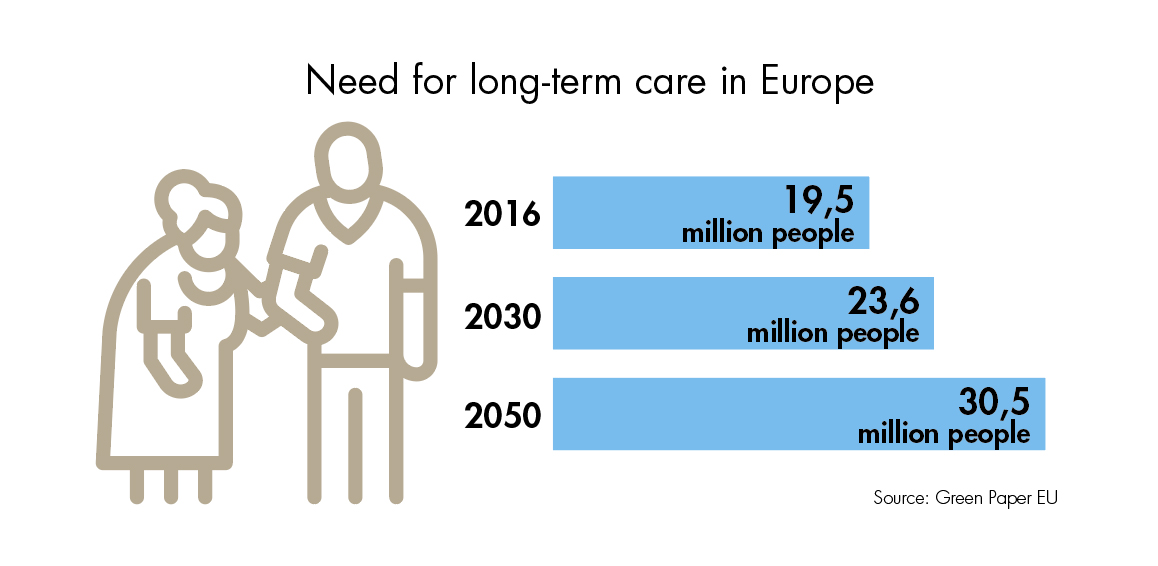
A decade for healthy ageing
Life expectancy in the world has increased as has the number of elderly people, an evolution that means challenges, along with economic and social opportunities.
The world population is ageing. The news is neither good nor bad, rather an evolution of our society. The positive side is that life expectancy has increased in all the countries around the world and many of the diseases that in the past were life-threatening today can be cured or have become chronic. How-ever, the ageing of the population makes us face up to many challenges. For this reason, the General Assembly of the United Nations decided to declare the 2021-2030 period as the Decade of Healthy Ageing, which is being led by the World Health Organisation. The initiative is attempting to bring together the efforts of governments and citizens to carry out a ”concerted, catalysing and collaborative action over 10 years, aimed at promoting longer and healthier lives,” sources from the UN explain. The aim is to reduce inequalities on the subject of health and to improve the lives of the elderly and their families.
More over 65s
The figures indicate that the evolution is becoming increasingly faster. Worldwide, according to data from the World Bank, in 2019 the over 65s made up 9.10% of the world population and the percentage has doubled over the last six decades. That is to say, we have gone from 150 million people over the age of 65 years in 1960 to 697 million in 2019. If we put the spotlight on Europe, the evolution is similar and we have already doubled the 12% that we had in 1950. Additionally, the forecasts indicate that in 2050 more than 36% of the European population will be over 65 years of age, according to the International Centre on Ageing (CENIE).
According to Eurostat, in Spain, four out of the ten European regions with the oldest population in 2050 will be Zamora, Leon, Asturias and Ourense. The data is corroborated by the National Statistics Institute: in 2021, Spain recorded a new maximum figure for ageing and it already quantifies 129 people aged 64 for every 100 of under 16 year olds. The modernisation of the country, greater economic well-being and improvements in the healthcare field are some of the reasons for this. And the fact is that at the beginning of the 20th century, the Spanish population had a life expectancy at birth of 35 years, while today it is above 83. The third highest in the world, only surpassed by Switzerland and Japan.
The ageing of the population is not new, although it has speeded up in recent times. Throughout the world since 1950, life expectancy has increased considerably, which means an improvement in the survival of the elderly. Additionally, there has also been a notable drop in fertility during these years, caused by bad employment prospects or low wage expectations of women. For all these reasons, the experts foresee that the levels of birth and death will continue falling in the first half of the 21st century. It is worth mentioning that Spain, along with Portugal, Greece and Italy are amongst the ten countries in the world with the lowest birth rates.
Japan leads the list
This evolution towards older societies affects the entire world, although it started in the countries with high incomes, such as Japan, where 30% of the population is over the age of 60. Currently, these changes are now being seen in countries with low and medium incomes. Therefore, the experts predict that in 2050 two thirds of the world population of over the age of 60 years will live in the latter countries.
All of this means a challenge for society, because the number of retired people will increase and the percentage of those who are of working age will reduce. In the 2019 report ‘World Population Prospects’, the UN already warns that “the drop in the proportion of the population of working age is exercising pressure on the social welfare systems.· And the fact is that the ratio of potential support, which compares the number of people of working age with those over the age of 65 years, is reducing all over the world.
In Japan it is already 1.8 and for 2050, it is expected that in 48 countries, particularly in Europe North America and Eastern and South Eastern Asia, the figures will be below two. That is to say, for every two or less workers there will be a retired person. This means a great impact on the labour market and a great fiscal impact that many countries will have to face up to in order to develop and maintain public medical care, pensions and social welfare systems for the elderly.
Fewer workers
According to the CENIE, “it is critical that the proportion of people who are working and who can attend to the elderly is reducing and all of this is getting worse as the amount of people who need attention rises. This imbalance between the demand and the offer, which leads to the shortage of nurses and other professional care suppliers, is already challenging the countries that are ageing rapidly, such as Spain or Portugal.” Additionally, they warn that ·the increase in the demand for care will also require important financial resources.”
In Europe it is predicted that the expenditure on healthcare and on pensions will increase by 2.3 percent for 2040. Over the last 40 years, healthcare expenditure in Spain has increased by almost 3.2 percent until reaching 8.1% of the GDP. In fact, in 2005, the average expenditure per capita of people from the ages of 65 to 74 years doubled the average of the total population and that of those over 75 almost tripled it.







